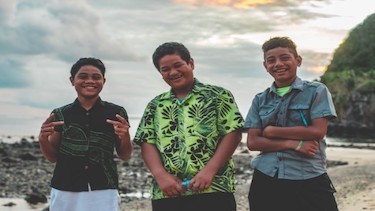BOOSTING DIABETES PREVENTION

Image © Mareko Tamaleaa, Unsplash
A community intervention program has improved the health of people of Samoan heritage in south-western Sydney.
A doctor approached a Western Sydney University diabetes expert, Distinguished Professor David Simmons from the School of Medicine, at a conference, and explained how she was struggling to treat patients of Samoan heritage. She described how many of her patients in south-western Sydney were being treated in hospital, or dying from avoidable complications of diabetes.
Simmons relayed the conversation to his colleague at Western, Dr Freya MacMillan, an associate professor in the School of Health Sciences, and this became the impetus for Simmons and MacMillan to establish a pilot study. With three Samoan churches in south-western Sydney, they set up a reference group of community leaders to advise them in the project. Churches are the central meeting point for the Samoan community both in their home country, and in Australia.
Australia has a significant number of immigrants from the Pacific Islands. According to the 2016 census, 75,755 people are of Samoan heritage and more than 40% of them live in New South Wales. Samoans have an inherited predisposition to diabetes, but prior to the Western study, there was little research on the effectiveness of public health interventions to reduce the health risks of diabetes in this immigrant group.
In 2017 MacMillan and Simmons’ team developed a program called Le Taeao Afua (the new dawn) derived from evidence-based research on community interventions and tailored by participants themselves to fit the Australian-Samoan lifestyle. The University trained a Samoan community activator, who in turn trained 20 church volunteers to become peer support facilitators.
Of the 187 participants first enrolled, 96% were overweight or obese and 32% had Type 2 diabetes. “The really worrying thing was that 13% didn’t even know they had diabetes until we tested their blood,” says MacMillan.
Volunteers developed workshops and more than 100 activities covering 12 public health messages dealing with diet and exercise. These included cooking classes that introduced people to new vegetables, and also revived other vegies used in Samoan culture, or promoted steaming and grilling instead of deep frying.
“We looked at affordable and seasonal options to take away the stigma that healthy eating is expensive,” says Ronda Thompson, the community activator. Zumba classes, resistance band exercises and family power-walking were some of the physical activity favourites. Feedback suggested that competitive activities were motivating, says MacMillan.
After 3-8 months, the participants had statistically significant reductions in HbA1c levels, average blood sugar for the past two to three months, showing that the project had improved people’s health. MacMillan says the average blood glucose reduction was the equivalent to a reduction from a dose of diabetes medication.
Following the pilot’s success, the University secured $4.5 million to roll their program out to 48 churches encompassing other Pacific communities across Sydney over the next five years. The team will train more community activators to reach more than 3,600 adults and 1,000 children.
After the arrival of COVID-19, MacMillan says the group quickly pivoted resources towards providing vaccination information to Pacific communities. This process taught them valuable lessons about how to organise baseline data collection for their diabetes project. “We found that getting multiple churches to come to what had been our ‘Covid hubs’ was resource-effective,” says MacMillan.
“We’re thinking about affordable translation,” she explains. “And by empowering communities, our goal is to embed this program into the health care system.”
Need to Know
- Many people of Samoan heritage in south-western Sydney are at risk of diabetes.
- Western’s Simmons and MacMillan developed a community intervention program called Le Taeao Afua.
- Program participants had significant reductions in average blood glucose levels.
For more examples of how Western Sydney University is driving social transformation, refer to their latest, special SDG edition of Future Makers: https://www.westernsydney.edu.au/future-makers/sdgs-issue